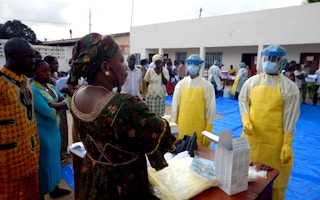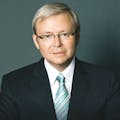At the start of the year, when Covid-19 was ravaging Wuhan, China, and beginning to envelop the West, I warned that the crisis would likely be replicated across much of the developing world, with significant long-term consequences for us all. Sadly, this prediction was correct.
As of mid-October, India is on track to overtake the United States as the country with the highest total of Covid-19 cases, and Latin America has experienced the most deaths of any region of the world.
The World Bank warns that the pandemic could push around 50 million people in Asia and around 30 million in Africa into extreme poverty this year alone. If so, it will be the first time in more than two decades that the global rate of extreme poverty has increased.
The Covid-19 crisis has also accelerated other concerning shifts that were already underway, including the escalation of tensions between the US and China, rising protectionism, and a carbon-intensive recovery that threatens to set the world back in the fight against climate change. All of these trends will make the pre-pandemic development agenda even more difficult to achieve.
At the global level, the challenge is to ensure that vulnerable people everywhere are protected. Failing that, we will be entering a much more dangerous world, and the prospects for a robust global economic recovery will be severely diminished.
I know from experience just how important the current moment is. Even in the midst of the global financial crisis a decade ago, my government remained steadfast in our commitment to increase Australia’s foreign-aid budget to 0.5 per cent of gross national income (GNI).
Unfortunately, that change was delayed, and Australia’s foreign assistance has since fallen to less than half that level – its lowest ever.
To their credit, British Prime Minister David Cameron’s government pursued a similar course of action in 2013, legislating – even in the midst of the austerity that followed – a commitment to the foreign-aid target of 0.7 per cent of GNI called for under the United Nations Millennium Development Goals (MDGs) at the time.
And even earlier, at the height of the crisis in April 2009, my government worked with that of British Prime Minister Gordon Brown to ensure that the world’s largest economies reaffirmed their commitments to achieving the MDGs despite the crisis.
As the ones holding the purse strings, legislators have a particularly important role to play in ensuring that governments don’t lose sight of the development agenda as they rush to protect their own populations from the devastating health and economic fallout of this pandemic.
The good news is that some governments, especially in Europe, have already recognised the importance of increasing their foreign aid at this time.
The bad news is that the UN secretary-general’s call for a $2 billion recovery fund for the world’s poorest countries has not yet been met, nor have mission-critical organisations like Gavi, the Vaccine Alliance (which helps to deploy vaccines in developing countries) received anywhere near as much support as they need.
And other development needs that will be crucial for resolving the crisis – not least water and sanitation – are crying out for attention.
Increasing development aid during the pandemic is not only the right thing to do. It is also a smart strategy for buttressing our own economic recovery. But foreign-aid increases by some countries obviously have been offset by the actions of others, notably the US, which has cut its assistance during this crisis, including to critical institutions like the World Health Organisation.
The problem is that too often, we see foreign aid as a handout rather than as a stepping-stone to prosperity. I have made this point in Australia, where economic recovery will depend on the broader recovery across Asia. Australia relies heavily on regional trade, and international education has become Australia’s third-largest export: one-sixth of all university students in the country hail from somewhere else in the region.
Under Managing Director Kristalina Georgieva’s leadership, the International Monetary Fund has been at the forefront of cushioning the pandemic’s blow to the global economy, and especially to the world’s most vulnerable populations. Having learned from the experience of the global financial crisis a decade ago, the IMF has already funneled more than $100 billion in financial assistance to countries in need.
Still, more reforms to the international financial system could be made to put us on the road to a full global recovery. For example, we need to ensure that today’s increased support for the IMF is seen not as a one-off injection, but rather as the start of an effort to provide more resources over the long term.
Equally important, at some point the distribution of membership shares must be realigned to increase the weight of dynamic emerging-market economies in the IMF’s decision-making.
At the same time, actions taken by the G20 and groups like the Paris Club are critical, and have already allowed more than 40 countries to suspend debt repayments, sparing them the hard choices between servicing debts and saving lives.
But the challenge for lenders now is to figure out how to provide more systemic relief, rather than simply turning the tap back on once the crisis seems to have passed, or once their own economic recovery or domestic interests demand it.
Whether we emerge from this crisis stronger or weaker will depend as much on governments’ decisions affecting people elsewhere as on their decisions for their own populations. Now more than ever, we need governments to act as global citizens.
A longer version of this text was recently published by the Parliamentary Network of the World Bank and International Monetary Fund.
Kevin Rudd, a former prime minister of Australia (2007-10, and 2013), is a member of the International Monetary Fund’s External Advisory Group, Chair of the United Nation’s Global Partnership on Sanitation and Water for All, and President of the Asia Society Policy Institute.
Copyright: Project Syndicate, 2020.
www.project-syndicate.org













